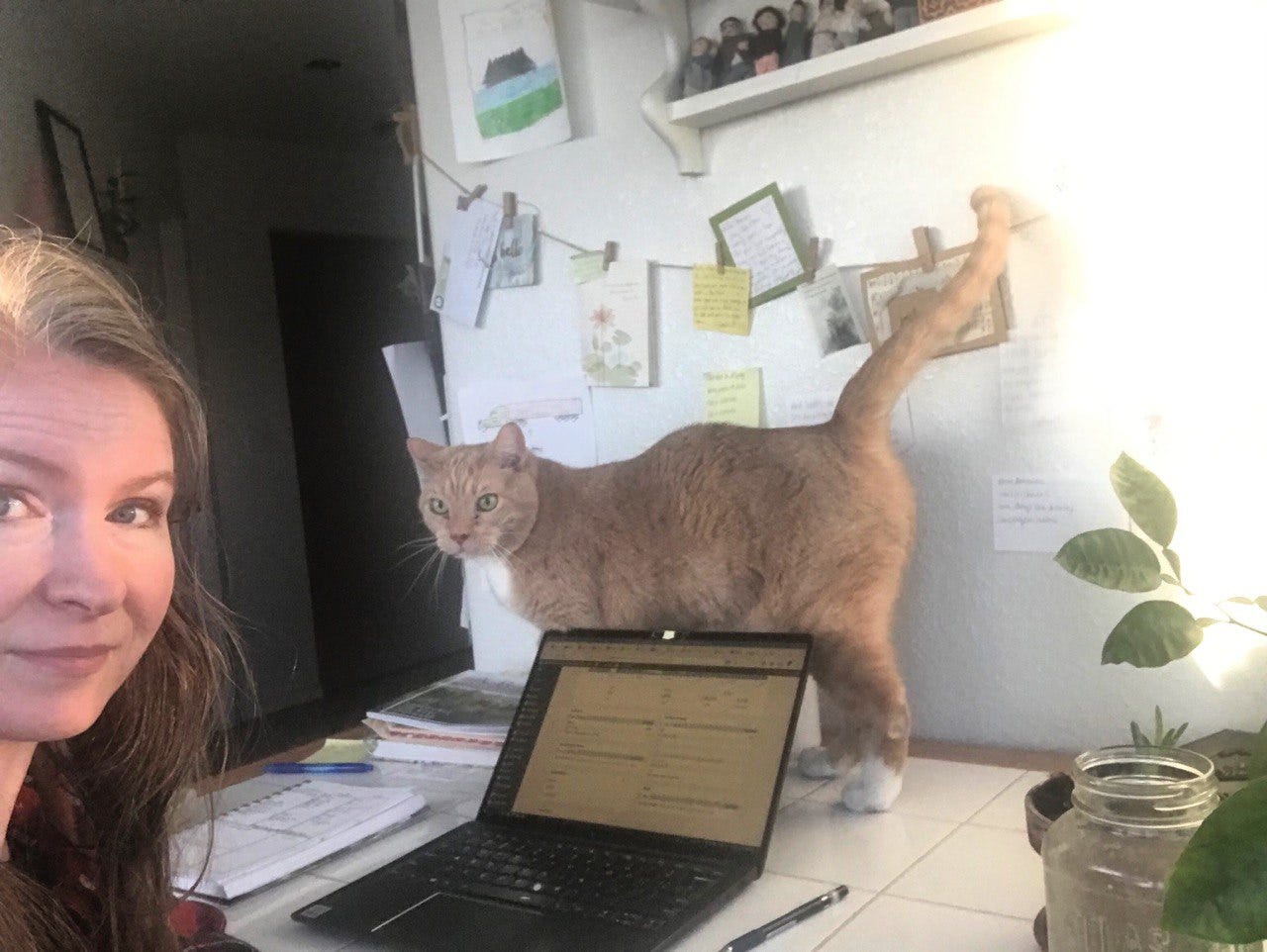It may be the drunken-like boldness that comes after several days of sickness, but I have emerged with sudden lucidity about ChatGPT.
I’ve been wrestling because I recognize one side of it as convenience and progress. But to be totally honest, I’ve also avoided it as a disgruntled snob, sort of like how professional cooks shun pre-made, canned spaghetti sauce.

Convenience and progress are important. We have a tankless water heater and our family takes full advantage of the fact that not only do we not have to pump, haul, and heat every drop of water we need, we also enjoy unlimited hot water straight from the tap. It’s so magical.
And yet, there are many who have struggled to just have enough water to survive. In comparison to their fight to have just enough to live on, if they could see our ease they might think we didn’t earn or deserve what they’ve had to work so hard for.
It’s understandable. Times and places and cultures are different, though.
And also, while there may be some skill needed in gathering and hauling water, it’s not an ability that a person works for decades to achieve. It’s something they do because they have to, to survive.
So on one hand, we’re talking about convenience and progress, and I am all for convenience, and mostly even for progress, depending on how you define it. I’m grateful to have a clean, modern mattress rather than a straw-filled pallet. I love flushing toilets and electricity. And don’t get me started on the marvelous bliss known as espresso.

But on the other hand, there’s another kind of convenience that robs us, sort of like taking cold medicine when you really just need to let a fever and other symptoms do their work to heal your body. When you don’t do that, you become dependent on artificial medicine that just hides those symptoms, and your body forgets how to heal the way it was designed to. Eventually all sorts of bad things eventually result…like people dependent on a medical system that profits from illness rather than educates on healing, and eventually encourages people to do things like wear masks while swimming because their IQ has dropped to the level of a toaster.
This is not progress.
In that vein, we could also broach the issue of calculators, which were rarely allowed in class when I was in school but now are pretty much used by all of us for everything from budgeting to figuring out how much change we should be getting back from the barista.
Have we collectively been dumbed down, made lazier? Yes, for sure.
So that’s a thing. And it progressed with the advent of computers and smartphones and pretty much every advance in technology, really.

I use a laptop with the conveniences of Copy, Cut, Paste, Undo, Delete, and even CAPSLOCK for when I’m feeling particularly punchy. Dickens, Austen, and the Brontes didn’t have those. (Well, they had literal scissors and paste, and I’ve heard some of them used it, but that’s much more complicated than hitting a few keys.) Tolstoy, Mitchell, Dostoevsky, Scott, and all those guys inserted and crossed out and rearranged and rewrote by hand.
By! hand!
In junior high and high school, all of my papers (including the dreaded 5-paragraph essays) were written by hand. Even my earliest college papers were pre-computer. Draft after draft after draft, I’d finally put it all together as a final copy in the neatest version of my messy scrawl.
I cannot imagine putting together Pride and Prejudice, Little Dorrit, or (gasp, hand me the smelling salts) the 1100 pages of Gone With the Wind that way. Not only did these writers create such incredible stories, but they had the discipline, tenacity, and mental clarity to pull such projects together without the help of highlight, click, and drag.
Meanwhile, I get distracted if the cats start meowing for food while I’m trying to put a complex sentence together. I will never be the writers these guys were; my world and ability and culture is different. I use tools they didn’t have, and benefit from them…but I have also traded ability for the convenience of using them.
But here’s what seems to be the crux of the difference: I will never pretend to be those writers, either. I do not present my work as someone who has put the effort into organizing and writing everything by hand.
Did tailors and seamstresses feel this way when the sewing machine was invented? There were mixed reactions. It shifted (and in some ways destroyed) the careers and artisanship of those who had mastered the craft by hand, and yet many of them were grateful for the ease the machine brought in making production that much simpler.
What about photography? Even though people like my husband went to school to learn the nuances of it, I can now easily take a beautiful photo with my phone because the technology does all the work. But I’m not fooling anyone about poring over images in a dark room – everyone knows that all I did was aim and click.
We enjoy these conveniences and we do not lie to the public about how we achieved the works derived from them. So in that sense, ChatGPT and its cronies are perfectly legit as tools to help lay people. For example, if you need help creating a legal document, or checking grammar for an email, or you need a few lines of code for your website, no shame, I get it.
So that’s one side.
On the other side, though, there’s so much more.
With many conveniences, tasks are simplified. For example, in using calculators, we relinquish our ability to solve a simple problem. But with AI doing our creating for us, we relinquish our abilities to express, communicate, and innovate.
We were made in the image of the Creator, so we were made to create. He spoke and things happened; and life and death are in the power of our words, too. We have no business abdicating our expression to AI, casting off our reflection of God and the partnership we have with Him in creating.
It’s not just writing, but art, film, and all sorts of media are being replaced by this cheap coin-slot alternative. Do we really want our humanity replaced, made obsolete?

Dear Kingdom-minded professional content creators: The breath of God within you is worth something.
It cost Him something for us to be able to express what He put within us. Are we so indifferent to the price He paid that we’re willing to trade our expression and reflection of Him – our honest work – to present an inflated offering?
There’s a story about this in the Bible, and it’s a formidable warning to those who would offer up a dishonest sacrifice.
It’s the time of the early Church, and the cool kids (well, Barnabas, at least) have started a trend of selling large assets so the proceeds could be used toward expansion of the Kingdom. So far, so good.
But a man named Ananias, with the consent of his wife Sapphira, sold a piece of property; with his wife’s knowledge, he kept back some of the proceeds and brought only a part and laid it at the apostles’ feet.
– Acts 5:1-2
He wanted credit for giving the whole thing when he knew he hadn’t given it all.
“Ananias,” Peter asked, “why has Satan filled your heart to lie to the Holy Spirit and to keep back part of the proceeds of the land? While it remained unsold, did it not remain your own? And after it was sold, were not the proceeds at your disposal? How is it that you have contrived this deed in your heart? You did not lie to us but to God!”
Now when Ananias heard these words, he fell down and died. And great fear seized all who heard of it. The young men came and wrapped up his body, then carried him out and buried him.
– Acts 5:3-6
Contrast this with King David, who said, “I will not offer burnt offerings to the Lord my God that cost me nothing.”
When used by professionals on the sly, ChatGPT and other AI tools are bougie conveniences: Big hat, no cattle, declaring to the world that something was created when it was merely…faked.
In a precious few places I’ve seen Christian content creators preface their work with, “I used ChatGPT to help me with this,” and I appreciate their honesty. But if the writer/artist doesn’t do that and they use these tools to do the work for them, they are saying, Look, I did this, even though they didn’t.
Maybe they wrote part of it, or started with the initial ideas, or even plugged in a draft for the program to polish. But none of that is equal to putting in hours upon hours of work – not to mention years of study and practice – to put forth a piece that is cohesive, creative, and well done. In that sense, it is much like athletes cheating by taking performance-enhancing drugs to get an advantage over their competitors who are doing honest work.
So ChatGPT is not just a new convenience, like a word processor. ChatGPT is also a hired hand, a ghostwriter who does the work while the name on the cover takes the credit. Additionally, it makes even genuine writers suspect, because if ChatGPT and other forms of AI creation become the assumed latest modern conveniences that everyone uses (even when we don’t), gone are the days when any of us gets credit for truly creating our own work.
As someone who has spent decades on this craft – and it is a craft, a skill that is developed with much practice and earned to some degree – the sudden rush of anyone and everyone cranking out books, posts, or even slews of social media promotions just by plugging in a prompt into a program feels like theft to me.
Oh, you told ChatGPT what to do, and it just…did it? That’s how you wrote your posts, and finished your book? That’s cute. Here are my shelves of books on writing that I’ve studied, and here’s my fourth laptop – I’ve slogged away on it until the characters are blurred on seven keys, and the left Shift button is cracked.

I know it sounds like a measure of superiority and bitterness, for sure. But I don’t think I’m a better person than someone who uses AI to write their posts. I just know I’m a better writer, because I’ve done the work.
Many of us have paid a price to achieve this. And some are taking credit for paying that price when they have not in fact done so.
After an interval of about three hours [Ananias’] wife came in, not knowing what had happened. Peter said to her, “Tell me whether you and your husband sold the land for such and such a price.” And she said, “Yes, that was the price.”
Then Peter said to her, “How is it that you have agreed together to put the Spirit of the Lord to the test? Look, the feet of those who have buried your husband are at the door, and they will carry you out.”
– Acts 5:8-9
The sacrifice itself was good on its own. It became cheap and sinful when it was passed off as being more than what it really cost the giver.
If the intent is to use it as a tool, we can be honest about that. If someone needs the help, there’s no shame in taking advantage of it. We use electric drills, laptops, crock pots. I use a thesaurus, concordance, various Bible tools, and about 32 other tabs on two browsers. Tools are meant to be used.
The problem comes when the end result is faked, and offered as something it is not. If I sew something on a machine, I’m not going to represent it as something I stitched by hand. If I buy pastries from a bakery and bring them to potluck, I don’t take credit for making anything more than a purchase.
So it’s the misrepresentation that is meant to deceive and take credit that is the issue here. When we take credit for something we did not do, we cheapen the work of those who actually do create authentically.
So then, putting away falsehood, let each of you speak the truth with your neighbor, for we are members of one another….And do not grieve the Holy Spirit of God, with which you were marked with a seal for the day of redemption.
– Ephesians 4:25, 30
We still have amazing photographers and seamstresses and tailors, even though technology has changed. But will we still have amazing writers and artists if anyone can fake it, everyone is suspect, and eventually people won’t even notice the difference?
I hope so. We work solo Deo gloria, not solo AI gloria. We’ve been given so much to say, and we will not trade the breath of God in our work to gain applause for a cheapened sacrifice.

Want more posts like this? Subscribe here — they’re all written by me, with the help of Bingley who is terrible at typing but super fond of the Caps Lock button.













